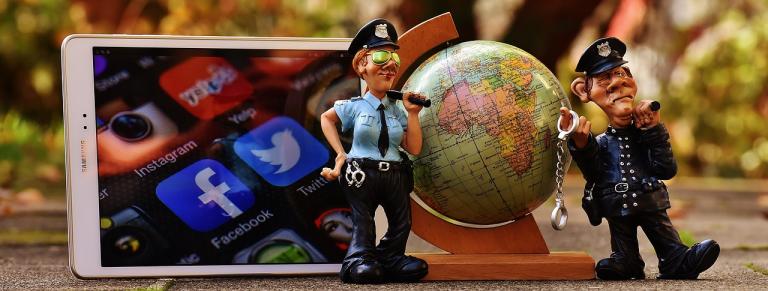An agency of the Lutheran Church Missouri Synod was cancelled by Facebook, collateral damage in big tech’s “deplatforming” movement that is shutting down free speech on the internet.
The Lutheran Center for Religious Liberty put out a response to the Capital riot entitled “A Prayerful Thought: Vigilante Violence Always Betrays the Cause. . . .Prayer and Faithfulness Fortify the cause.” It was a condemnation of the devolution of the January 6 protests into lawlessness, drawing on Luther’s critique of the Peasant Revolt.
The head of the institute, former Lutheran hour speaker Gregory Seltz, posted it on the Center’s Facebook page. He wanted to “boost” it, so as to give the statement a wider audience. (Facebook allows open business sites to “boost” posts for a fee, whereupon they are circulated far and wide.) But FaceBook wouldn’t allow that. “At a time when we at the LCRL seek to be truth tellers for the sake of our culture (even reconcilers at this moment), we received this notice. REJECTED.”
Evidently, Facebook’s algorithms and nanny-bots can’t distinguish condemning violence from advocating violence.
(You can find the statement, which is quite good, by scrolling down here. Again, Facebook allowed the statement to be posted, just not boosted.)
This is an example of the breathtaking way the big internet corporations have locked out not just individuals from expressing their opinions but entire topics of conversation. It started when Twitter finally banned Donald Trump. (As I have said, if Twitter had done that years ago, Trump would have won re-election, since he wouldn’t have been able to antagonize so many people against him.) The reasoning was that his inflammatory rhetoric was dangerous in this climate of “sedition.” Youtube followed by shutting down his channel.
But then Facebook, Instagram, Snapchat, YouTube, Twitch, TikTok, Reddit, Discord, and Pinterest followed suit, banning not only Trump but pro-Trump material and any complaints that the election was stolen. Meanwhile, Amazon and Shopify banned Trump and right wing merchandise. Apple and Google dropped the right wing social media site Parler from their App stores, and Amazon, whose Cloud servers hosted the site, simply shut it down.
One might argue that the actions prevented more violence by preventing radicals from planning their “insurrection,” though the corporations have been very tolerant of the insurrection planned by left wing radicals. But apart from this particular issue, the actions demonstrate the mind-boggling power of big tech.
In the early days, the internet was hailed as a realm of freedom. Gone would be the gatekeepers–the publishing companies, the newspapers, the intellectual elite that determined what information would be disseminated in the public. Now everyone with a computer could have the equivalent of a printing press, with blogs, online forums, desktop publishing, and websites allowing for the true democratization of knowledge and public discourse.
But now, the wild-west of the early internet, with countless players, has become largely controlled by just a few corporations. The gatekeepers have returned, and they can control information and thus their users far more completely than governments ever could.
“Deplatforming” is the tactic used by leftists on campus to “cancel” speakers and views they disapprove of. The idea is not just to censor what they say but to take away the “platform”–the campus lecture, an academic journal, a public debate–that would give their views an audience. (Read this description of deplatforming as a political tactic.) But now the technological platforms are themselves organizing to exert control what is allowed to be said.
Non-Trumpian observers–such as German Chancellor Angela Merkel, Russian dissident Alexey Navalny, and the left-leaning American Civil Liberties Union—have expressed alarm about this attempt to shut down speech in a free country.
One could reply that the liberties protected in the Bill of Rights apply only to government action. These corporations, being private companies, have the freedom to operate as they like, even when this infringes on civil liberties.
But the issue is more complicated than that. In an article entitled Save The Constitution from Big Tech, Vivek Ramaswamy and constitutional scholar Jed Rubenfeld argue that private infringement on civil liberties may be legally problematic after all. They quote the Supreme Court case Norwood v. Harrison (1973), which ruled that it is “axiomatic,” that the government “may not induce, encourage or promote private persons to accomplish what it is constitutionally forbidden to accomplish.”
They argue, with examples from case law, that the immunities granted tech companies, such as Sec. 230 of the 1996 Communications Decency Act–which give tech companies immunity from censoring Constitutionally-protected speech–and the threats of politicians to punish companies unless they police “hate speech” make Norwood v. Harrison apply.
Here is another idea of how to legally restrict corporations from doing what government is forbidden to do in violating the Bill of Rights. Use the anti-discrimination statutes. In addition to forbidding discrimination against people for their sex, gender identity, and sexual identity, categories more recently added, these laws at their core forbid discrimination on the basis of “race, color, or creed.”
A “creed” means a belief. It shouldn’t have to just apply to religious creeds–a term that comes from the Latin “credo” for “I believe”–but should have a broader applicability, including political, ideological, or cultural beliefs. To censor someone’s speech or to take away someone’s platform because of their “creed” is an act of discrimination.
Image by �Merry Christmas � from Pixabay












